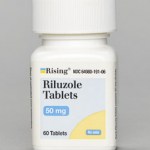- Type of Drug: Glutamate-release blocker.
- Prescribed for: Amyotrophic lateral sclerosis (also known as ALS or Lou Gehrig’s disease).
Riluzole (Rilutek) General Information
ALS is a chronic disease of the nervous system for which there has been no effective drug treatment until now. Riluzole, the first medicine ever proven to affect ALS, has a number of different actions, though nobody knows exactly how it works. The drug slows the release of glutamate, which is thought to damage important nerve centers in the brains of people with ALS, and protects other aspects of nerve function both inside and outside the nerve cell.
In studies up to 5 years done primarily with people with ALS, Riluzole improved survival during 18 months of treatment, though muscle strength and nerve function were not improved by the drug. Still, death rates at the end of the studies were the same whether people took Riluzole or not. In one study, the average survival improvement for people taking Riluzole was 60 days. Riluzole doses larger than 100 mg a day only increase the chances for drug side effects; they are not more effective.
Animals bred to mimic the nervous-system defects of ALS lived longer when given Riluzole. It also protected nerves from damage in laboratory experiments.
About 90 percent of each Riluzole tablet is absorbed into the blood, but food interferes with this absorption process. Riluzole is broken down in the liver and passes out of the body through the kidneys. Cigarette smoking is likely to increase the rate at which Riluzole is broken down, but there is no indication as yet that cigarette smokers need higher doses than nonsmokers.
Riluzole (Rilutek) Cautions and Warnings
Do not take Riluzole if you are allergic to it or any of the tablet ingredients.
Riluzole causes liver inflammation, and people with severe liver disease should use this drug with caution. Liver function tests should be done for everyone taking Riluzole. People with kidney disease should also use Riluzole with caution.
Women break down this drug more slowly than men and tend to have more medicine in their blood than men, but this does not affect drug dosage.
Possible Side Effects
About 14 percent of people who took Riluzole in preapproval studies stopped taking it because of side effects.
- Most common: weakness, nausea, dizziness (twice as common in women than men), diarrhea, a tingling sensation around the mouth, appetite loss, fainting, and tiredness. These effects increase as the dose is raised.
- Common: poor lung function, abdominal pain, pneumonia, and vomiting.
Less common: back pain, headache, upset stomach (at high doses), stomach gas, stuffed arid runny nose, cough, high blood pressure, joint aches, swelling in the arms and legs, urinary infection and painful urination (both at high doses), and dizziness when rising from a lying or sitting position (at high doses). - Rare: aggravation, not feeling well, mouth infections, eczema, rapid heartbeat, and vein irritation.
In studies in which the same number of people took Riluzole as took an inactive pill (placebo), side effects experienced by people taking Riluzole were weight loss, depression, muscle spasticity, dry mouth, itching, bronchitis, sinus irritation, accidental injury, constipation, swallowing and breathing problems, flu symptoms, increased sputum production, pneumonia, and breathing disorders. v
Other Riluzole side effects can affect virtually every body system. Report anything unusual to your doctor at once.
Riluzole (Rilutek) Drug Interactions
• Drugs that are toxic to the liver, such as Allopurinol, Methyldopa, and Sulfasalazine, may interact with Riluzole. Combinations of such drugs should be taken with caution.
• Caffeine, Theophylline, Phenacetin, Amitriptytline, and quinolone antibacterials may slow the rate at which Riluzole is eliminated from your body.
• Cigarette smoke, charcoal-broiled foods, Rifampicin, and Omeprazole could increase the rate at which Riluzole is eliminated from your body.
• Riluzole can potentially increase the breakdown of Caffeine, Theophylline, and Tacrine, but these effects have not actually been seen in people.
Riluzole (Rilutek) Food Interactions
Take Riluzole on an empty stomach, 1 hour before or 2 hours after meals.
Usual Dose
Adult: 50 mg every 12 hours.
Child: not recommended.
Overdosage
There have been no reports of Riluzole overdose. Overdose victims should be taken to a hospital emergency room for treatment at once. ALWAYS bring the medicine bottle with you.
Riluzole (Rilutek) Special Information
Doses higher than 50 mg twice a day do not improve your condition and may increase your chances for drug side effects.
Call your doctor at once if you become feverish or ill. This could be a sign of a very low white-blood-cell count.
Riluzole should be taken at the same time each day (morning and evening) to get maximum benefit and keep steady levels of the drug in your blood.
Riluzole can make you dizzy, tired, or faint. Don’t drive or do anything that requires intense concentration until you can judge how Riluzole affects you.
People taking this medicine should not drink to excess. Studies of Japanese natives showed they took twice as long to clear the drug from their bodies as Caucasians. It is possible that genetic factors or environmental factors such as cigarette smoking, alcohol, coffee, or diet could be responsible, but the exact reasons are not known.
Store your Riluzole tablets between 68° and 77° F and protect them from bright light.
If you forget a dose of Riluzole, take it as soon as you remember. If it is almost time for your next dose, skip the forgotten dose and continue with your regular schedule.
Riluzole (Rilutek) Special Populations
Pregnancy/Breast-feeding
Riluzole was toxic to pregnant lab animals at doses up to 11 times larger than the maximum human dose. There are no studies of Riluzole in pregnant women. It should be used during pregnancy only if its possible benefits outweigh its risks.
It is not known if Riluzole passes into breast milk. Nursing mothers who must take this drug should bottle-feed their babies.
Seniors
Older adults with kidney or liver disease should use Riluzole with caution.

